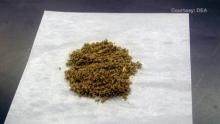, according to data from the national Monitoring the Future survey.
SCs are more potent than marijuana (as much as 100 times stronger); do not contain the anti-anxiety and antipsychotic constituent of marijuana, cannabidiol; and have a greater risk of a range of adverse effects, such as tachycardia, agitation, nausea, generalized tonic-clonic seizures, psychiatric problems, and death.
Joseph J. Palamar, PhD, MPH, of New York University, and his colleagues set out to examine data about current use of SCs, as previous studies had focused on lifetime or past-year use. Monitoring the Future surveys approximately 15,000 high school seniors annually in the United States. Of the six survey forms (which are distributed randomly), only two asked seniors about their current use of SCs, limiting the current study to a third of the survey sample.
The researchers found that, while 81% of current SC users also reported current use of marijuana, only 9% of current marijuana users reported current use of SCs. SC use was correlated much more highly than marijuana use with the current use of other drugs such as LSD (15% vs. 3%), opioids (14% vs. 6%), cocaine (11% vs. 3%), and heroin (6% vs. 0.1%).
“Current SC use appears to be part of a more extensive polydrug use repertoire involving other illegal drugs that are less prevalent among marijuana-only users. ... These associations suggest the need to target marijuana users who also use other drugs to help prevent initiation of SCs,” concluded Dr. Palamar and his associates.
Read more at (Pediatrics. 2017 Oct;140[4]:e20171330).


